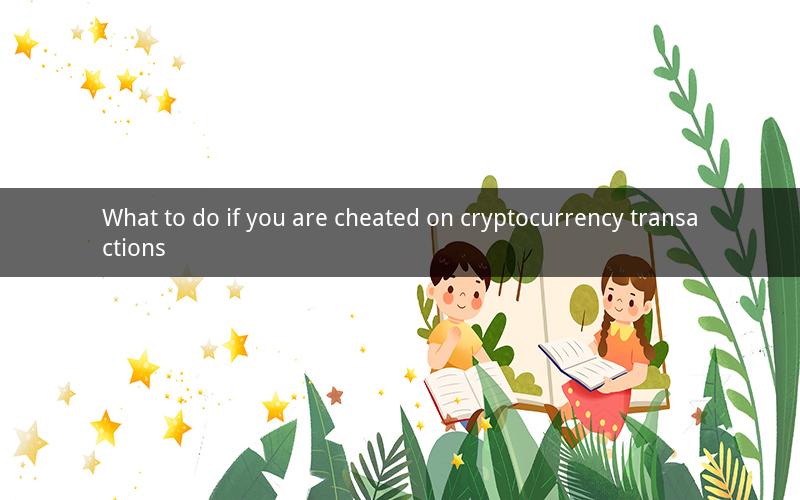
Table of Contents
1. Understanding Cryptocurrency Transactions
2. Identifying Signs of Fraud
3. Steps to Take Immediately
4. Reporting the Incident
5. Documenting Evidence
6. Contacting Authorities
7. Securing Your Accounts
8. Preventing Future Fraud
9. Seeking Legal Advice
10. Joining Support Groups
---
1. Understanding Cryptocurrency Transactions
Cryptocurrency transactions are digital exchanges of value that occur on blockchain networks. They are often faster, more secure, and less expensive than traditional banking transactions. However, the decentralized nature of cryptocurrencies also makes them susceptible to fraud and scams.
2. Identifying Signs of Fraud
To protect yourself from cryptocurrency fraud, it's crucial to recognize the signs of potential scams. These may include:
- Unusually high interest rates or returns on investments
- Pressure to act quickly or invest large sums of money
- Requests for personal or financial information
- Promises of guaranteed profits or returns
- Unregistered or unlicensed platforms
3. Steps to Take Immediately
If you suspect you have been cheated in a cryptocurrency transaction, here are the steps to take:
- Pause All Transactions: Stop any further transactions with the suspicious party or platform.
- Secure Your Accounts: Change your passwords and enable two-factor authentication for all related accounts.
- Document Evidence: Keep a record of all communications, transactions, and screenshots of any suspicious activity.
4. Reporting the Incident
Report the incident to the relevant authorities, such as:
- Your country's financial regulatory authority: For example, the Financial Conduct Authority (FCA) in the UK or the Securities and Exchange Commission (SEC) in the US.
- The cryptocurrency exchange or wallet provider: Inform them of the fraudulent activity and request assistance.
- The cryptocurrency community: Share your experience on forums and social media to warn others.
5. Documenting Evidence
Collect and preserve any evidence of the fraud, including:
- Transaction histories
- Communication logs
- Screenshots of suspicious activity
- Any documents or records related to the transaction
6. Contacting Authorities
Contact the authorities responsible for investigating financial fraud in your country. Provide them with the evidence you have collected and follow their instructions.
7. Securing Your Accounts
To prevent further fraud, take the following steps:
- Change Passwords: Update passwords for all related accounts, using strong, unique passwords.
- Enable Two-Factor Authentication: Add an extra layer of security by enabling two-factor authentication for all accounts.
- Monitor Your Accounts: Regularly check your accounts for any unusual activity.
8. Preventing Future Fraud
To protect yourself from future cryptocurrency fraud, consider the following measures:
- Educate Yourself: Learn about the risks and best practices for cryptocurrency transactions.
- Research Platforms and Projects: Before investing, research the platform, team, and project thoroughly.
- Use Secure Platforms: Only use reputable and regulated cryptocurrency exchanges and wallets.
- Stay Informed: Keep up-to-date with the latest news and developments in the cryptocurrency industry.
9. Seeking Legal Advice
If the fraud results in significant financial loss, consider seeking legal advice. An attorney can help you understand your rights and options, and may assist in pursuing legal action against the fraudulent party.
10. Joining Support Groups
Joining support groups can provide emotional support and practical advice for dealing with cryptocurrency fraud. These groups can also help you stay informed about the latest scams and fraud prevention strategies.
---
Questions and Answers
1. What should I do if I receive a suspicious email asking for my cryptocurrency wallet address?
- Do not respond to the email and delete it immediately. Report it to the relevant authorities and your cryptocurrency exchange or wallet provider.
2. How can I verify the legitimacy of a cryptocurrency exchange?
- Check if the exchange is registered and regulated by a financial authority in your country. Research online reviews and ratings, and ensure the exchange has a secure website and reliable customer support.
3. Can I reverse a cryptocurrency transaction if it was fraudulent?
- Unfortunately, reversing a cryptocurrency transaction is not possible. It's essential to take immediate steps to secure your accounts and report the incident to authorities.
4. What should I do if I lose my private keys for my cryptocurrency wallet?
- Contact the wallet provider for assistance. They may be able to help you regain access to your funds if you have a backup of your private keys or recovery phrase.
5. How can I protect myself from phishing scams in cryptocurrency?
- Be cautious of emails, messages, or calls asking for your personal or financial information. Always verify the identity of the sender before providing any sensitive data.
6. Can I recover my cryptocurrency if it was stolen from a hacked exchange?
- It may be possible to recover your cryptocurrency if the exchange has insurance or a recovery fund. Contact the exchange and provide them with the necessary evidence.
7. What should I do if I invest in a cryptocurrency project that turns out to be a scam?
- Report the incident to the relevant authorities and the cryptocurrency community. Consider seeking legal advice if you have suffered significant financial loss.
8. How can I stay informed about the latest cryptocurrency scams?
- Follow reputable news sources, join cryptocurrency forums, and subscribe to security alerts from your country's financial regulatory authority.
9. What are some common cryptocurrency scams to watch out for?
- Phishing scams, Ponzi schemes, fake ICOs, and pump-and-dump schemes are some of the most common cryptocurrency scams.
10. How can I help prevent cryptocurrency fraud?
- Educate yourself and others about the risks and best practices for cryptocurrency transactions. Report suspicious activity to authorities and share your experiences with the cryptocurrency community.